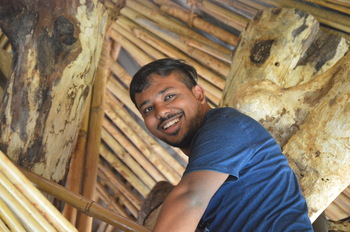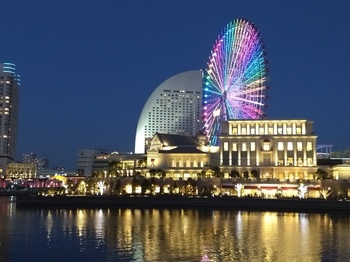ELSI Blog
150 15 Days: Reflections from an ELSI Visiting Fellow
Susovan Sarkar. Credit: Dr. Tony Jia
I had the opportunity to attend the 7th International Symposium at the Earth-Life Science Institute (ELSI) in Tokyo, Japan. This was my first time outside my country, India. I was extremely excited to meet researchers, learn new things, gather ideas and to explore Tokyo. I must say, the whole trip was beautiful and did not fail to amaze me. The expenditure of my entire visit was completely covered by ELSI, as I applied through the Research Interaction Committee (RIC) programme at ELSI. I have been really lucky to have ELSI researcher Dr Tony Z Jia to help me throughout the process. Tony hosted me at ELSI, facilitated my interaction with other researchers, supported as a local guide and made my stay in Tokyo a fruitful one. The staff at ELSI is extremely kind, who all assisted me with the visa process. The first thing that I noticed in Japan was how humble and helpful the Japanese people are.
My first week at ELSI was exciting, and a bit overwhelming as the 7th International Symposium was going on. The symposium's main focus was towards understanding Comparative Emergence. Researchers and students from diverse disciplines came together under one roof to discuss and understand what emergence really means to difference disciplines. It was completely a new experience for me. Apart from the exciting talks from brilliant speakers, there were small discussion groups at the end of each day where we discussed and learnt more about different aspects of comparative emergence. On each day of the symposium, there was a poster session, where I got the chance to present my work and got valuable input. This facilitated me a lot to refine my work. I was also introduced to some new ideas and concepts while interacting with other students. The symposium was divided into different sessions, which started with the emergence of the universe and ended up with the emergence of emergence which was beautiful in its own way. The speakers talked about a lot of topics across different disciplines, such as the emergence of planetary complexity, network formation within society, the emergence of Life, characterizing emergence etc. The panel discussions at the end of the day was the cherry on the cake, which allowed me to have a better understanding of the term emergence. The term emergence possess different meanings across disciplines. I was also fortunate to see the inauguration ceremony of the Mishima Hall at ELSI followed by a stunning Taiko drum performance. The symposium ended up with a big discussion at the agora hall with all the participants.
The next week at ELSI was relatively loose but equally exciting as the first week. The 7th international symposium ended as it started. As I was a visiting fellow, a beautiful office was allocated to me at ELSI 2. I really liked the infrastructure of both ELSI 1 and 2 buildings. Everyday discussions over coffee at ELSI 1 Agora hall and at the ELSI 2 Lounge with tables with continents as designs were fascinating. The overall visit allowed me to connect with different researchers across the globe and start up new collaborations. I visited different laboratories and instrument facility of ELSI, accompanied by ELSI researchers Tony Jia, Kristin Johnson and Rehanna Afrin who showed me every corner. I could not help myself but look at the high-end research facilities available. People at ELSI are very kind and collaborative, not because they need but because they want to. At the end of my visit, I got the opportunity to present my work at the Origins meetings in front of ELSI and other visiting researches. The main objective of Origins meeting is to have a weekly discussion between ELSI and visiting researchers, to share the ideas and research on the Origins of Life in order to overall strengthen and from new research networks across the globe. The discussion helped me a lot to shape up my projects and to adopt an unbiased, holistic and multi-disciplinary approach towards my work. At last, it would be unfair if I do not talk about my overall experience in Japan. Dr Tony and other people at ELSI took me to different places in Tokyo and helped me to explore new places, food and culture, which enriched me from inside. Overall it was an amazing experience and I definitely look forward to coming back to ELSI again. Once I got lost in Japan on my way to Yokohama Hakkeijima Sea Paradise which made me to realise the fact that my supervisor Dr. Sudha Rajamani told me once that is "Japan is the best place in the world to get lost".
Beautiful giant Ferris wheel at Yokohama. Credit: Susovan sarkar
--------------------------------------------------------------------------------------------------------------------
Author's bio:
Susovan Sarkar, PhD student at IISER Pune, India, working with Dr.Sudha Rajamani on the Chemical Origins of Life.
"I finished my undergraduate studies on microbiology and chemistry in 2015 and joined integrated -PhD program at IISER Pune. I finally joined Dr Sudha Rajamani's COoL (Chemical Origins of Life) in 2017 and working on to understand the fundamental process that led to the transition from chemistry to biology on the early Earth."













